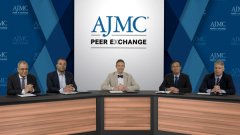
HIMALAYA Study and IMbrave150 Trial
An overview of the HIMALAYA study and IMbrave150 trial are provided.
Episodes in this series

The panel discussion centered on the nuanced treatment strategies and evolving landscape of hepatocellular carcinoma (HCC), delving into the significance of considering overall value, cost-effectiveness, and patient outcomes. Martin F. Dietrich, MD, PhD, initiated the conversation, emphasizing the importance of consulting NCCN guidelines for treatment decisions in HCC. They reviewed category 1 therapies, highlighting the IMbrave150 regimen, a combination of bevacizumab and atezolizumab, and the tremelimumab-actl regimen, both showing significant overall survival benefits compared to sorafenib in phase 3 studies. The discussion highlighted the unique challenges and potential tailoring of treatments to individual patients, stressing the significance of the art of medicine in managing adverse effects and ensuring patient safety.
Acknowledging the exciting advancements in HCC treatment, the speakers noted the considerable impact of innovative therapies such as atezolizumab, bevacizumab, tremelimumab-actl, and durvalumab. They underscored the importance of multiple treatment options, emphasizing that patient preferences and circumstances should guide treatment decisions, especially considering the strict inclusion criteria of clinical trials that might not always align with individual patients.
Ghassan Abou-Alfa, MD, MBA, provided an overview of the trial design and outcomes of the IMbrave150 trial and the HIMALAYA study, both showcasing encouraging results. The studies, conducted in a similar fashion, demonstrated substantial improvements in overall survival, highlighting the significance of carefully interpreting the data and understanding the patient population. The comparison of the trial outcomes underscored the need to consider the nuanced implications and characteristics of the patient population in making treatment decisions.
The speakers reiterated the significance of value comparison in treatment decisions, emphasizing the need for a comprehensive understanding of the data beyond surface-level interpretations. They stressed the importance of evaluating the specific patient demographics and circumstances in the context of the trial results, highlighting the critical role of individualized patient care in optimizing treatment outcomes.
Overall, the discussion highlighted the positive impact of the growing options for HCC treatment, reflecting on the transformative journey from a time when patients had limited therapeutic choices to the current landscape of multiple innovative therapies. The panelists emphasized the need for a patient-centric approach, emphasizing the significance of considering patient preferences and circumstances in decision-making, particularly in light of the evolving treatment landscape and the complex nature of HCC. They underscored the significance of continued research and nuanced interpretation of clinical trial data in advancing the understanding and treatment of HCC.
Video synopsis is AI-generated and reviewed by AJMC editorial staff.
Newsletter
Stay ahead of policy, cost, and value—subscribe to AJMC for expert insights at the intersection of clinical care and health economics.









